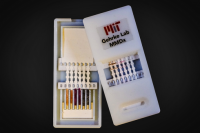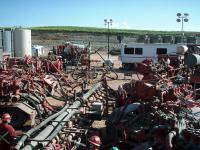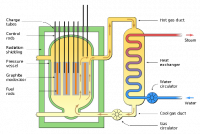-
ISIS manufacturing chemical weapons: UN watchdog
A team of investigators at the Organization for the Prohibition of Chemical Weapons (OPCW) said that there is “worrying” evidence ISIS is making its own chemical weapons. An OPCW team of investigators said they had found evidence of the use of homemade sulphur mustard in attacks in Syria and Iraq.
-
-
Airflow study to be conducted in NYC Subway
The Department of Homeland Security (DHS) Science and Technology Directorate (S&T) will conduct a week-long airflow study in portions of the New York City (NYC) subway system to gather data on the behavior of airborne particles in the event contaminants were released. This study poses no risk to the general public and will run from 9 to 13 May.
-
-
Measuring electromagnetic radiation exposure
Society demands continuous implementation of new transmission systems due to ongoing development of communication technologies. These systems work by emitting electromagnetic waves. As a result, population is exposed to a significant increase of environmental radiation levels. Researchers from UPM have developed a portable device that allows continuous monitoring the exposure levels to electromagnetic radiations of a person who wears such device.
-
-
New drug to combat the effects of nerve agents
Sarin is a colorless, odorless liquid fatal even at very low concentrations. Serious sarin poisoning causes visual disturbance, vomiting, breathing difficulties and, finally, death. A ground-breaking study describes the development of a new drug which counteracts the effects of sarin gas.
-
-
Cellphone-sized device detects the Ebola virus quickly

The worst of the recent Ebola epidemic is over, but the threat of future outbreaks lingers. Monitoring the virus requires laboratories with trained personnel, which limits how rapidly tests can be done. Now scientists report in ACS’ journal Analytical Chemistry a handheld instrument that detects Ebola quickly and could be used in remote locations.
-
-
What we learned from Chernobyl about how radiation affects our bodies
The world has never seen a nuclear accident as severe as the one that unfolded when a reactor exploded in Chernobyl on 26 April 1986, sending vast amounts of radiation into the skies around Ukraine, Belarus and Russia. The planet had experienced massive releases like this before, in the bombings of Hiroshima and Nagasaki in 1945. But Chernobyl-related radiation exposure had a more protracted character. It was the first time in history that such a large population, particularly at a very young age, was exposed to radioactive isotopes, namely iodine-131 and cesium-137, not just through direct exposure, but through eating contaminated food as well.
-
-
Groundwater quality changes alongside the expansion of hydraulic fracturing and horizontal drilling

New research demonstrates that groundwater quality changes alongside the expansion of horizontal drilling and hydraulic fracturing but also suggests that some potentially hazardous effects may dissipate over time. The research is the first to analyze groundwater quality in the Cline Shale region of West Texas before, during, and after the expansion of hydraulic fracturing and horizontal drilling.
-
-
More money for nuclear safety pledged on Chernobyl 30th anniversary
The EU and other global donors have pledged an additional $99 million to help secure the Chernobyl power plant, as ceremonies in the Ukraine mark thirty years since the disaster. The money will be used to construct a new spent nuclear waste storage facility, adding to the €2 billion already donated to helping clean up and secure the Chernobyl site. A new giant $1.7 billion steel structure will be placed over the nuclear reactor this year to prevent further radioactive leaks. The old concrete structure was put together after the meltdown, but experts say it is not leak-proof and that, in any event, it is beginning to show its age.
-
-
The legacy of Chernobyl -- 30 years on
The 26 April 2016 marks the 30th anniversary of the Chernobyl nuclear accident. For many, especially those born since 1986, it is a word they know without appreciating the full significance of what happened on that day. For others, it was a life changing catastrophe which resulted in largest release of radioactivity in the history of nuclear energy.
-
-
Dealing with irradiated nuclear graphite

Since the beginning of the nuclear power industry, a large number of channel uranium-graphite nuclear power reactors was built across the world. To date, they all are on the output stage of the operation or decommissioning preparation. Approximately 250,000 tons of irradiated graphite are accumulated in the world, including ~ 60,000 tons in Russia. Due to the specificity of irradiated graphite, the treatment of this type of radioactive waste has not been determined yet.
-
-
Forget Fukushima: Chernobyl still holds record as worst nuclear accident for public health
The 1986 Chernobyl and 2011 Fukushima nuclear power plant accidents both share the notorious distinction of attaining the highest accident rating on the International Atomic Energy Agency (IAEA) scale of nuclear accidents. No other reactor incident has ever received this Level 7 “major accident” designation in the history of nuclear power. But the IAEA scale isn’t designed to measure public health impact. Chernobyl is by far the worst nuclear power plant accident of all time. It was a totally human-made event which was made worse by incompetent workers who did all the wrong things when attempting to avert a meltdown. Fukushima in contrast, was an unfortunate natural disaster – caused by a tsunami that flooded reactor basements — and the workers acted responsibly to mitigate the damage despite loss of electrical power. In terms of health ramifications, these two nuclear accidents were not even in the same league. While Fukushima involved radioactivity exposures to hundreds of thousands of people, Chernobyl exposed hundreds of millions. And millions of those received substantially more exposure than the people of Fukushima.
-
-
Belgium turns down Germany’s request to shutter two aging Belgian nuclear plants
Belgium on Wednesday turned down a request by Germany to shut down two ageing nuclear power near the German-Belgium border. Belgium said the two plants, while old, still meet the strictest safety standards. Both the Doel and Tihange power stations, in operation since 1974, were scheduled to be shut down and decommissioned in 2015.
-
-
New Yorker sentenced to 16 years for trying to buy ricin
It was a scary scenario: Chinese national Cheng Le, living in New York City, attempted to order ricin through the so-called dark Web. Ricin is a highly potent and potentially fatal toxin with no known antidote. What did Le plan to do with the ricin? Nothing good. According to U.S. Attorney for the Southern District of New York Preet Bharara, “In Le’s own words, established at trial, he was looking for ‘simple and easy death pills’ and ways to commit ‘100 percent risk-free’ murder.”
-
-
Improving detection of concealed nuclear materials

Researchers have demonstrated proof of concept for a novel low-energy nuclear reaction imaging technique designed to detect the presence of “special nuclear materials” — weapons-grade uranium and plutonium — in cargo containers arriving at U.S. ports. The method relies on a combination of neutrons and high-energy photons to detect shielded radioactive materials inside the containers.
-
-
Coded apertures improves, shrinks mass spectrometers for field use

A modern twist on an old technology could soon help detect rogue methane leaks, hidden explosives, and much more. Mass spectrometers were invented in the 1930s, and they are still typically the size of an oven or refrigerator. Inherent hurdles to miniaturization have made it difficult to use them outside of a laboratory. Researchers are using software to dramatically improve the performance of chemical-sniffing mass spectrometers. With the help of modern data analytics, researchers have demonstrated a technology using a so-called “coded aperture” that promises to shrink these devices while maintaining their performance.
-
More headlines
The long view
Keeping the Lights on with Nuclear Waste: Radiochemistry Transforms Nuclear Waste into Strategic Materials
How UNLV radiochemistry is pioneering the future of energy in the Southwest by salvaging strategic materials from nuclear dumps –and making it safe.
Model Predicts Long-Term Effects of Nuclear Waste on Underground Disposal Systems
The simulations matched results from an underground lab experiment in Switzerland, suggesting modeling could be used to validate the safety of nuclear disposal sites.
